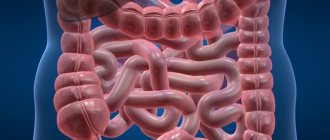Vomiting is a nonspecific symptom that can have many causes: from diseases of the gastrointestinal tract to meningitis. Some physiological conditions, such as pregnancy, are initially accompanied by vomiting. In each specific case, a doctor’s consultation and a thorough diagnosis are necessary to determine the cause of this condition. Further treatment tactics and prognosis will depend on this.
Vomiting is a reflex act with the involuntary release of gastric contents through the mouth (rarely through the nose). It is caused by an increase in sphincter tone in the pyloric part of the stomach, relaxation of its fundus and the cardiac sphincter of the esophagus. At the same time, contraction of the abdominal muscles occurs with an increase in pressure in the abdominal cavity.
The act of vomiting is controlled by a specific center in the brain stem (in the area of the reticular formation). This zone has a dense network of capillaries, but lacks an effective blood-brain barrier. Therefore, the vomiting center is excited by various chemicals or metabolic products contained in the blood and cerebrospinal fluid. Mechanical irritation of the vomiting center is caused by a nearby tumor, hematoma, or inflammatory process.
Afferent (sensitive) nerve fibers from the gastrointestinal tract, pharynx, and vestibular apparatus are sent to the brain stem. Thus, any diseases of these organs can provoke vomiting.
What disease may constant vomiting indicate?
There are various groups of diseases that occur with constant vomiting. Depending on the nature of its occurrence and characteristics, the disease is diagnosed:
- Central vomiting – meningitis, migraine, hypertensive crisis, encephalitis, glaucoma, brain tumors and abscess, damage to the inner ear;
- Psychogenic vomiting – hysterical neurosis, anorexia, attacks of cyclic vomiting in children;
- Hematogenous-toxic vomiting - uremia, acetonemic vomiting in diabetes mellitus, porphyria, carbon monoxide poisoning, alcohol, drugs, cytostatics, radiocontrast agents, exposure to viral and bacterial toxins in infectious lesions;
- Visceral vomiting – pathologies of the gastrointestinal tract (gastritis, peptic ulcer, duodenitis), diseases of the biliary and urinary tracts, acute appendicitis, pyloric stenosis, atony and gastric paresis;
- Vomiting with a putrid odor – stomach cancer;
- Vomiting with a fecal odor – intestinal obstruction;
- Bloody vomiting – gastrointestinal bleeding;
- Vomiting with bile – complications after surgery on the stomach, biliary colic, narrowing of the duodenum;
- Vomiting with undigested food - gastric achylia, achalasia of the esophagus.
To clarify the diagnosis, a bacteriological, chemical, cytological study of vomit is carried out, the relationship of vomiting with food intake is studied (morning, early, late, fasting, night and cyclic vomiting).
Symptoms
Typically, the act of vomiting occurs in three phases:
- pre-eruption;
- gagging;
- post-eruption.
In the first phase, vegetative and somatic precursors appear. Nausea, a feeling of a lump in the throat, salivation, epigastric discomfort, sweating, and paleness of the face occur.
After vomiting, most people experience relief. Sometimes slight nausea, weakness, and dizziness persist.
It is important to pay attention to the composition, color and nature of the vomit. Their appearance often helps to tentatively establish a diagnosis:
- With an admixture of fresh blood: bleeding from the esophagus with varicose veins against the background of cirrhosis;
- Coffee grounds colors: due to the effect of acidic stomach contents on the blood, with stomach ulcers or tumors, often combined with black stools (melena);
- With bile: for diseases of the gallbladder, cholelithiasis.
- With an unpleasant odor due to bacterial decomposition: with intestinal occlusion, the presence of a fistula.
In addition, the time of vomiting indicates the cause of its occurrence:
- In the morning: during pregnancy, kidney failure, after drinking too much alcohol the day before;
- During meals or immediately after: for bulimia, anorexia, acute gastritis, poisoning;
- From one to several hours after eating: with a stomach ulcer, narrowing of the pylorus (pyloric stenosis);
- Regardless of food intake: brain diseases, increased intracranial pressure, migraine.
Why might there be water vomiting?
This type of vomiting is extremely rare, except for artificially induced vomiting during gastric lavage.
Causes of water vomiting in children:
- Runny nose;
- Colds;
- Teething;
- Pathologies of the ear, nose and throat.
All these reasons are due to large amounts of mucus entering the stomach. It flows from the nasal and oral cavities through the throat and esophagus into the stomach. Irritation of its mucous membrane causes vomiting. The consequence of this is vomiting of water without impurities.
In the absence of visible causes of the disease, this symptom manifests itself due to excessive dry air, exposure to air in frosty weather, and also due to an allergic reaction. In this case, the release of a large volume of mucus is the body’s protective reaction to the negative influence of the environment. Then everything happens according to the algorithm described above - the mucus irritates the gastric mucosa, where it enters in excess quantities.
It is not difficult to eliminate this symptom in children; you need to create optimal living conditions and cure the pathology of the ENT organs.
If vomiting water is diagnosed in an adult, this may be due to long breaks between meals. Gastric juice is secreted reflexively, and the longer the interval between meals, the more juice is formed in the stomach. If a large amount of juice causes vomiting, it may seem like you are vomiting water. Visually, these liquids are almost indistinguishable from each other.
For various reasons, a person does not feel that he is hungry, however, the body needs food. This condition leads to excessive production of stomach acid and vomiting that looks like water.
Common Causes of Vomiting
Nausea from strong odors of perfume, raw meat, fish or cooked food is a frequent companion of pregnant women. And if this is not pregnancy, then what? Then you should contact a gastroenterologist, endocrinologist, therapist or neurologist for advice.
Causes of vomiting due to odors can be:
- hunger - this is how the stomach reminds you that breakfast and lunch should be on schedule, it is advisable to have a full breakfast before traveling on stuffy public transport;
- chronic gastrointestinal diseases;
- nervous overstrain - neuroses, stress, depression;
- allergies or poisoning.
Unpleasant sounds such as the sound of vomiting, scratching with a knife on a plate, the sound of a microphone malfunction with prolonged exposure also provoke vomiting. An unpleasant sight often causes nausea. Such a reaction indicates excessive impressionability, and sometimes even the first stages of neurosis.
Nausea against the background of non-existent odors. When it seems like it smells like burning or something else, it may indicate brain tumors.
Many people live and cope with nausea on their own, without paying much attention and without thinking about the real reasons. Although sometimes this is the only early sign of heart problems, ear infections and other hidden inflammatory processes.
Can there be vomiting with mucus and why?
An admixture of mucus occurs in many pathologies in both children and adults. Diseases for which vomiting with mucus is diagnosed:
- Flu;
- Rotavirus (“stomach flu”);
- Dietary disorders in chronic gastritis;
- Acute erosive gastritis;
- Damage to the mucous membrane by alkalis or acids (suicide attempt, accident).
Vomiting with mucus in infants is normal. However, in this age category, such vomiting may be the result of an accumulation of mucus due to inflammation of the bronchi. An infant cannot cough it up due to his age. When children consume foods of a special consistency (milk, jelly, fruit juices with pulp), vomiting with mucus is also observed.
Can there be black vomit and is it dangerous?
Black vomiting may be a sign of a serious pathology or have a physiological cause. Some foods turn vomiting black: chocolate, berries with dark pulp, etc. Knowing about their consumption on the eve of vomiting, you can only focus on relieving this unpleasant symptom.
Vomiting in the form of “coffee grounds” is a great danger. It indicates bleeding in the stomach or duodenum. The peculiar appearance of the blood indicates that it has oxidized and coagulated under the influence of gastric juice.
Diseases that cause bleeding in the gastrointestinal tract:
- Neoplasms of any etiology (tumors, polyps);
- Trauma to the mucous membrane of the stomach or intestines;
- Hemorrhagic disease;
- Ulcerative lesions of the stomach or small intestine;
- Side effects of drugs that can cause damage to the stomach or intestines (Indomethacin, Aspirin, Ibuprofen, drugs, steroid hormones);
- Alcoholism.
Stomach or intestinal bleeding is accompanied by dizziness and weakness. The patient's skin becomes pale, a feeling of apathy appears, and the person may faint. These symptoms are a reason to immediately call an ambulance, as delay can be life-threatening. If black vomit is the only symptom, you should still see a doctor as soon as possible.
What disease can cause a temperature of 38 and vomiting?
Diseases in which there is a combination of vomiting and high fever:
- Acute appendicitis;
- Acute respiratory viral infection;
- Acute gastroenteritis;
- Colds (bronchitis, tracheitis, pneumonia);
- Intestinal infection.
In the vast majority of cases, these symptoms are observed precisely during gastrointestinal infections. Children may react by vomiting to a rapid increase in temperature during any inflammatory process.
The initial manifestations of an intestinal infection and a viral disease are very similar: in both cases, hyperthermia, redness of the throat, and vomiting are observed. Specific symptoms appear a little later.
In any case, if vomiting is combined with a temperature of 38, you should urgently call “emergency help.” It is impossible to differentiate poisoning from an attack of appendicitis without a medical examination. Acute appendicitis requires urgent surgical intervention; serious poisoning requires treatment in a hospital.
On the subject: How and with what to reduce the temperature of an adult?
Can antibiotics cause vomiting?
Antibiotic drugs have a large number of side effects, and vomiting occurs when using these drugs along with other symptoms.
Causes of vomiting while taking antibiotics:
- Vomiting is a side effect of a specific drug;
- There is incompatibility of the antibiotic with concomitantly taken medications from other pharmacological groups;
- Dietary disturbances or alcohol consumption occurred during antibiotic therapy.
The occurrence of vomiting directly depends on the form in which the drug is taken. Antibiotics in tablet form are more likely to cause vomiting than the same drugs given in injection form. You should not refuse a particular medication if oral use causes vomiting. It is worth trying intravenous or intramuscular administration. Adjusting the dosage to reduce the volume or frequency of taking the medication will reduce the risk of this unpleasant side effect, but at the same time the effectiveness of the treatment may suffer.
Antibiotics that may cause vomiting:
- Amoxicillin;
- Azithromycin (Sumamed);
- Tetracycline;
- Streptomycin;
- Ciprofloxacin (Tsiprobay, Tsiprinol, Tsiprolet);
- Ampicillin;
- Erythromycin;
- Metronidazole (Trichopol, Metrogyl);
- Neomycin;
- Cefpodoxime (Cefodox);
- Gentamicin;
- Doxycycline.
Drugs that cause vomiting when used simultaneously with antibiotics:
- NSAIDs (Ibuprofen, Aspirin, Diclofenac, Indomethacin);
- Cardiac glycosides;
- Estrogens;
- Potassium sulfate, ferrous sulfate;
- Antiviral agents.
Drinking alcohol and eating fatty foods during antibiotic therapy may trigger vomiting and increase this side effect.
What to do if your child starts vomiting at night?
Parents are often interested in what medications can be given to a child to stop vomiting if the child vomits at night and has no fever? It should be noted that the use of any medications, especially by children, should be carried out solely on the basis of the recommendations of the attending physician. To preserve the health and life of the child, it is strictly not recommended to self-medicate. If the baby’s vomiting is chronic, and the food or drinks consumed immediately come back out, he needs to be given an absorbent. Children are usually given products that come in powder form. They absorb and remove toxins.
To prevent dehydration, you need to give your child a solution of Regodron or glucose with salt. These measures are needed to maintain the balance of salts and minerals in the patient’s body. If vomiting is accompanied by a high temperature, be sure to use antipyretics. Eferalgan or Nurofen in the form of suppositories are excellent for this. Viferon helps increase immunity. For both children and adults, any medications should be given only in consultation with a doctor.
Can the temperature rise after vomiting and why?
An increase in temperature after vomiting indicates that poisoning, hepatitis, or intestinal infection (salmonellosis, dysentery) are occurring. Poisoning with low-quality food products manifests itself as diarrhea, a combination of nausea and vomiting, and abdominal pain. An increase in temperature can be observed after vomiting. This indicates that toxins have entered the blood. Despite the fact that the attack of vomiting somewhat reduced the amount of poisons that entered the body, even a minimal amount can cause hyperthermia.
Measures to detoxify the body:
- Gastric lavage;
- Taking diuretics (Furosemide);
- Taking sorbents (Polysorb, Enterosgel).
If these measures do not give the desired effect and the temperature does not return to normal, most likely the cause of hyperthermia is an intestinal infection (dysentery, salmonellosis) or viral hepatitis. To clarify the diagnosis, you need to consult with an infectious disease doctor.
Treatment
Help before diagnosis
You can reduce discomfort and the amount of vomiting with the help of diet therapy: patients are advised to give up fatty foods, large amounts of baked goods, and smoked meats. To reduce the load on the gastrointestinal tract, food should be taken 5-6 times a day, in small portions. It is acceptable to use herbal remedies (green tea, chamomile and mint decoctions), enterosorbents. Repeated vomiting, combined with abdominal pain or other symptoms, is an indication for visiting a doctor, who will determine its cause and select the optimal treatment regimen.
Conservative therapy
After verification of the cause of vomiting, patients are prescribed complex treatment using medications, physiotherapy and diet therapy. Medical tactics involve the use of therapeutic nutrition; the list of permitted products depends on the disease. In case of pathologies of the pancreas, fasting for several days is sometimes recommended to create functional rest of the organ. For the treatment of patients with complaints of vomiting, the following groups of drugs are indicated:
- Prokinetics
. Drugs that accelerate gastrointestinal motility stimulate the passage of food through the intestines, reduce gastric distension and reduce the frequency of vomiting. By increasing the tone of the lower esophageal sphincter, prokinetics are used to treat vomiting in GERD and esophageal dyskinesias. - Antisecretory drugs
. Vomiting can occur when the gastric mucosa is irritated by hydrochloric acid, so H2-histamine receptor blockers and proton pump inhibitors are used to neutralize it. The drugs are prescribed for long-term use of NSAIDs to prevent hematemesis. - Antibiotics
. Drugs with antibacterial properties are indicated for vomiting caused by severe intestinal infections. Therapy is selected empirically, taking into account the suspected pathogen, and after receiving the results of bacteriological culture, the treatment regimen is adjusted. - Enzyme preparations
. Medicines that contain digestive enzymes improve food digestion processes. Thanks to this, the frequency of regurgitation of rotten vomit in chronic pancreatitis and pathologies of the biliary tract is reduced. - Antiemetics
. Potent medications that affect the vomiting center in the brain are indicated for repeated painful vomiting. Medicines have significant side effects, so they are used only in severe situations.
Surgery
Repeated vomiting of bile or intestinal contents can serve as a symptom of acute surgical diseases of the gastrointestinal tract, which requires emergency surgical intervention. The type of operation depends on the specific disease: sanitation and drainage of the abdominal cavity, resection of a section of intestine, elimination of intestinal obstruction, and cholecystectomy can be performed. For decompensated pyloric stenosis, pyloroplasty is recommended. In oncopathology, the surgical method is combined with radiation therapy and chemotherapy.
Can worms cause vomiting?
Worm infestations provoke vomiting in both children and adults. Its appearance is specific - it is a foamy white discharge. It does not appear immediately after infection, but after 2-3 weeks.
At the first stage, a sick person may develop a dry cough and dermatitis, similar in appearance to hives due to allergies. At the end of the first stage, these symptoms are joined by nausea, excessive salivation, and signs of anxiety.
The appearance of vomiting with white foam is a reason to contact a parasitologist or infectious disease specialist. A more precise diagnosis is made after analyzing stool for worm eggs in a specialized laboratory.
general characteristics
At the time of vomiting, the patient experiences an uncontrolled contraction of the abdominal muscles and diaphragm, leading to a sharp release of gastric and, in some cases, intestinal contents.
The secreted masses may contain remnants of undigested food, mucous, bloody and bile inclusions, and other pathological impurities. Often the attack is preceded by nausea, profuse salivation, weakness, and sweating. Possible dizziness, unsteadiness of gait, rapid heartbeat. After an episode of vomiting, a sour, bitter, putrid taste or odor remains in the mouth and sometimes in the nasal passages. From the outside, the patient looks confused, pale, and beads of sweat are often visible on the forehead. The appearance of vomiting should always be regarded as a threatening condition that requires a medical examination. If the patient’s condition has improved after the vomit has passed, a visit to a general practitioner or family doctor may be scheduled. If indomitable vomiting occurs, blood, bile, mucus and feces are detected in it, the symptom is combined with hyperthermia, intense pain of any localization, diarrhea, stupor, disorientation and convulsions, you must call an ambulance.
Complications and consequences of vomiting
Short-term vomiting does not cause significant harm to the human body. Prolonged vomiting, on the contrary, causes serious metabolic disorders.
Complications and consequences of prolonged vomiting:
- There is a decrease in the volume of intracellular fluid, loss of hydrogen ions, and alkalosis develops - a change in the acid-base balance towards alkaline substances;
- Hypokalemia occurs as a result of potassium loss and excessive excretion by the kidneys;
- Metabolic disorders lead to loss of consciousness and paralysis;
- As a consequence of hypokalemia, arrhythmia, muscle weakness, nocturnal polyuria appear - an increase in the volume of urine excreted along with frequent urination at night;
- With severe vomiting, rupture of the mucous membrane of the esophagus, transmural rupture of the esophagus, rupture of the mucous membrane of the esophageal-gastric junction, accompanied by heavy bleeding, is possible.
These complications are especially relevant for children, weakened patients, and the elderly. Patients with impaired mental health can aspirate vomit into the respiratory tract. These complications lead to breathing problems and aspiration pneumonia.
First aid for vomiting
With the help of vomiting, the human body is freed from toxic substances.
An exception is vestibular disorders due to motion sickness, a condition after a traumatic brain injury, severe nervous strain, or stress.
First aid rules:
- You cannot stop the act of vomiting, you should wait until it is completed;
- After this, the person needs to be seated, cover the chest and knees with a towel or clean rags, place a bucket and basin at an accessible distance;
- If a person suffering from an attack of vomiting can only be in a lying position, you need to try to keep his head below chest level;
- An unconscious patient should tilt his head to the side so that he does not choke on vomit;
- After each attack, you need to rinse your mouth with cool water;
- Bed rest during such attacks is observed only when feeling unwell;
- To stop vomiting, Motilium, Cerucal, mint drops, Scopolamine (for motion sickness), and, if necessary, sorbent (activated carbon) are used.
Particular caution should be exercised if there are blood impurities in the vomit; they look like coffee grounds. This is a sign of stomach bleeding and requires immediate medical attention. Losing large amounts of fluid through vomiting leads to dehydration. It is necessary to return lost fluid as quickly as possible by drinking plenty of fluids and restoring the optimal concentration of mineral salts.
Solutions for relieving mineral deficiency:
- Regidron, Trisol – normalizes water and electrolyte balance, prevents dehydration;
- Gastrolit - in addition to the above properties, it has an anti-inflammatory effect, since the drug contains chamomile extract. Gastrolit is poured with boiling water and left to cool completely;
- Homemade saline solution - add 1 tsp to 1 liter of boiled water. salt, 1/2 tsp. soda, 7 tsp. sugar, mix thoroughly until the components are completely dissolved.
Any saline solution should be taken in small sips every 5-10 minutes. You can alternate this drink with unsweetened tea or a 5% glucose solution. This technique will help avoid excess salts.
Therapy for injuries
With various types of mechanical damage to the head or abdominal cavity, vomiting may occur. If peritoneal injuries are accompanied by heavy internal blood loss, then the doctors’ task is to stop it, as well as thoroughly wash the internal organs and install a drainage system.
For head injuries (concussion or traumatic brain injury), which are also accompanied by severe vomiting and other unpleasant symptoms, bed rest, analgesics, sedatives, diuretics, and medications against dizziness are recommended.
How to stop vomiting?
This symptom occurs for many reasons. Vomiting can be eliminated by applying in each specific case a specific etiotropic treatment aimed at combating the cause of the disease. If the cause cannot be identified, symptomatic drugs are used to stop vomiting.
Antiemetic drugs:
- If there is a disturbance in the functioning of the vestibular apparatus, causing vomiting during motion sickness, take Scopolamine, Ciel. The optimal dose is 1-2 tablets 2-3 times a day. Contraindications to the use of the drug Ciel are driving a car, as it reduces concentration;
- Vomiting after chemotherapy and radiation therapy in the treatment of malignant neoplasms, as well as repeated attacks of vomiting due to gastroenteritis, are eliminated with the drugs Emetron and Setronon. The main active ingredient of these drugs is ondansetron, the release form is tablets, solution for injection. Contraindications – hepatitis of various etiologies;
- Vomiting, the appearance of which is associated with the work of the central nervous system, is successfully stopped with the drugs Motilium and Cerucal. It can occur with migraine, traumatic brain injury, renal failure, gastric atony, gastroenteritis. The drugs are taken 1 tablet before meals 3-4 times a day;
- Vomiting, as a symptom of gastrointestinal pathology, is eliminated with the drug Cisapride (Coordinax). The product is more effective than Cerucal and Motilium, but its spectrum of action is limited to the digestive system. Directions for use: 1-2 tablets before meals;
- Vomiting caused by pregnancy toxicosis is stopped with the homeopathic drug Cocculin.
Nausea during inflammatory processes
Nausea and vomiting combined with dizziness and loss of balance are symptoms of ear inflammation. It occurs as a complication after influenza, otitis media, measles, tuberculosis, meningitis, scarlet fever and other infectious diseases.
Labyrinthitis is an inflammation of the inner ear, which has the shape of a labyrinth filled with endolymph. Not only are auditory analyzers located here, but also vestibular receptors are located in the tubules, which are responsible for orienting the body in space, balance and coordination. Inflammatory processes affect both functions, which provokes such symptoms.
Most often observed 1-2 weeks after otitis media. The middle ear is separated from the inner ear by a membrane. When inflamed, the wall swells and becomes permeable. Toxins and pathogens penetrate deeper, and purulent labyrinthitis occurs.
The following symptoms may be observed:
- heavy sweating;
- temperature;
- pallor;
- hyperemia of the facial skin - strong blush;
- tachycardia;
- discomfort in the heart area;
- noise in ears;
- hearing loss;
- nystagmus - a feeling that everything around you is spinning.
How to stop vomiting? With such symptoms, it is unwise to try to cope with the condition on your own. Before the ambulance arrives, the patient must be hydrated with special solutions to reduce dehydration. Further treatment will be aimed at eliminating inflammation. Antiemetic drugs may be used. Self-administration of such medications is undesirable.
The chronic form can occur unnoticed and symptoms are mild. Systematic dizziness, even short-term, should be alarming. Nystagmus can change direction. Impaired coordination of movement from a subtle tilt of the body to a fall, when it is difficult to rise without the help of others.
Important! The state of nausea and lightheadedness is not accompanied by heaviness and pain in the stomach; attacks of vomiting do not even bring temporary relief and are not associated with meals.
Labyrinthitis can occur after a head injury, if there has been damage to the integrity of the eardrum, or a crack in the skull.
Vomiting, diarrhea and fever often occur as a result of intoxication of the body against the background of pneumonia. Depending on the location of the source of the disease, pneumonia is divided into types with different clinical pictures. In other words, with a certain order of conditions that the patient suffers.
Important! Most often, pneumonia is manifested by high temperature, fever, excessive sweating and chills, which continues to worsen for 2-3 days. But there are also sluggish and undulating course of the disease without obvious signs.
Focal pneumonia affects a small part of the lungs. The patient complains of a prolonged cough with sputum, loss of strength, and chest pain when breathing. The temperature usually does not reach extreme values, and persistent fever is not observed. The disease progresses in waves: periods of improvement are followed by an increase in temperature with chills or short-term fever, and a general deterioration in well-being.
Croupous inflammation has a characteristic sign - “rusty” sputum. The disease is accompanied by a high temperature, a dry cough turns into a wet one with an admixture of blood particles, which determines the characteristic color of the sputum. Fever lasts for a long time, sometimes about 10 days. The decrease in temperature at times occurs sharply, and at the same time blood pressure drops. The patient loses consciousness. There are also complaints of shortness of breath and painful breathing. Herpes may appear on the face. The patient looks haggard, with an unhealthy blush, the wings of the nose swell with every breath.
Viral pneumonia is characterized by a rapid development of events: high temperature up to 40 degrees, shortness of breath, painful dry cough, aching joints and headache. In some cases, conjunctivitis, rhinitis, laryngitis, and tonsillitis are associated. Atypical pneumonia almost always provokes severe intoxication: diarrhea, nausea, vomiting.
Important! A blue tint to the fingertips and areas of the face indicates sluggish pneumonia and is caused by a lack of oxygen in the tissues.
An advanced cold causes coughing to the point of vomiting. The provoking factor will be a seizure attack simultaneously with a contraction of the diaphragm. A large accumulation of viscous sputum, which flows down the walls of the nasopharynx, leads to a feeling of nausea. Swallowing mucus also causes involuntary vomiting. An obsessive cough with gagging is observed in the following diseases:
- tracheitis;
- bronchitis;
- allergic reaction;
- tuberculosis;
- lungs' cancer;
- bronchial asthma.
With colds, the sputum is clear; if the sputum is purulent (yellow-green) in color, it means the cold is of viral or bacterial origin. Bronchial asthma causes yellow nasal discharge, which is caused by a high concentration of eosinophils, a subtype of white blood cells.
A vomiting cough is a companion of many heavy smokers. Sputum constantly accumulates in the nasopharynx. And if there is no desire to get rid of the addiction, it is important to regularly examine the lungs and carry out maintenance therapy.
How to relieve vomiting after alcohol?
Abuse of low-quality alcohol or its excessive use in most cases causes severe vomiting. It is accompanied by extremely unpleasant sensations, as it is always combined with strong and painful stomach cramps. The breakdown products of alcohol in combination with semi-digested food, passing through the esophagus and oral cavity, irritate their mucous membrane. All these sensations leave the impression of vomiting after drinking alcohol as a painful and difficult to tolerate process.
Vomiting is a kind of protection of the body from the absorption into the blood of toxic substances formed as a result of the breakdown of ethanol. Therefore, there is no need to stop the process; on the contrary, in many cases it is vomiting that helps reduce the consequences of alcohol poisoning.
To alleviate the condition of a person with alcoholic vomiting, proceed as follows:
- Prepare a soda solution to soften the acidity of the vomit at the rate of 2 tbsp. l. soda per liter of water. You need to drink as much soda solution as possible before vomiting appears;
- After the first attack of vomiting, rinse your mouth with clean water with the addition of lemon juice;
- Prepare a mash of crushed activated carbon (2 tablespoons of carbon powder per 1 liter of water) and give it to drink as much as possible. If vomiting has ended, activated charcoal will bind remaining toxins in the gastrointestinal tract;
- If vomiting resumes after the charcoal drink, rinse your mouth and drink one of the enterosorbents available in your home medicine cabinet (Enterosorb, Polysorb, Polyphepan) to bind the toxins remaining in the stomach and intestines;
- Each episode of vomiting ends with rinsing the mouth and drinking mineral water.
Prevention
Regardless of age, it is worth following certain rules, and rotavirus gastroenteritis will most likely not overcome a person. To understand what to do to avoid getting infected, you will need to remember under what conditions you can catch this virus. Through unwashed food, dirty hands and contact with an infected person, anyone can contract rotavirus. Only the intensity of infection depends on the individual characteristics of the body and immune system.
To avoid illness, you should wash your hands with soap after using the toilet, visiting public places (buses, supermarkets, hospitals, schools, offices), before eating food, and after contact with animals. Wash the fruit thoroughly; for small children, pour boiling water over it. Wash your things on time, clean the house, ventilate the room. Strengthen your immunity and children by consuming the necessary vitamins and eating right. It is important to have an active lifestyle, walking outside or playing sports.
If we are talking about small children, it is worth keeping them clean, washing their toys, and pouring boiling water over them. Particular attention must be paid to the food consumed - the food must be fresh. Wash the fruits thoroughly and peel the apples. Avoid drinking raw water. Speaking of milk, it should be subject to heat treatment, even fresh milk.
Which doctor should I contact?
To diagnose a disease manifested by vomiting, you need to contact a gastroenterologist or therapist. If the symptom is central vomiting, it is quite possible that you will need to consult a neurologist, and for psychogenic vomiting, a psychotherapist.
Treatment of vomiting is impossible without a thorough diagnosis of the underlying disease and treatment of its manifestations. Manifestations of the gag reflex should not be ignored; they can be a symptom of dangerous pathologies.
Author of the article:
Alekseeva Maria Yurievna |
Therapist Education: From 2010 to 2021 practicing physician at the therapeutic hospital of the central medical unit No. 21, the city of Elektrostal. Since 2021 he has been working at diagnostic center No. 3. Our authors










